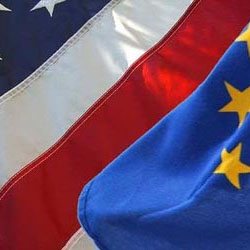TTIP Action aggregates the latest news and best analysis from across the United States and European Union on the ongoing negotiations for the Transatlantic Trade and Investment Partnership (TTIP).
News
President Obama to Democrats: ‘Keep your powder dry’
At an annual Senate Democratic retreat on Wednesday, President Obama sent a rallying call to his fellow Democrats to support his trade agenda – both the TPP and TTIP. Mr. Obama moreover promised to do what he can to help Democratic senators get re-elected later this year. (Politico)
EU Lawmakers Call for Stronger Safety Net for Failing Banks
The European Parliament on Thursday voted overwhelmingly to strengthen plans to deal with failing banks in Europe. Although a general banking resolution scheme was agreed to last year, the European Parliament has called out certain cracks in the agreement. This resolution calls for the prompt establishment of a shared fund to cover the costs of bank failure, and a more effective decision-making mechanism to wind down banks, when necessary. (Reuters)
US Said Near Deal With EU on Reprieve for Swap-Trading Rules
Negotiations between the Commodity Futures Trading Commission (CFTC) and European authorities are nearing the end of a deal to grant European swap-trading platforms a reprieve from Dodd-Frank rules that come into effect next week. This agreement comes on the heels of, and further clarifies, the “Common Path Forward” agreement reached last Fall. (Bloomberg)
Recent Analysis
William Galston: Obama’s Moment of Truth on Trade
William Galston’s op-ed in the Wall Street Journal draws a parallel between the current struggle between President Obama and Congressional trade opposition with former President Clinton’s strategy to deal with Democratic opposition against NAFTA. He outlines some lessons Mr. Obama can learn from the Clinton era to get more Democrats on board. Importantly, Galston calls for President Obama to address the nation on the benefits of his trade agenda to help sway public opinion, and Congress by association. (Wall Street Journal)
Toward a Transatlantic Energy Alliance? Liberalization of Energy Trade in TTIP
The energy sector is among the least liberalized sectors in international commerce. In his op-ed for the Huffington Post, David Koranyi, deputy director of the Atlantic Council’s Eurasia Center, makes the argument that including energy markets in a TTIP deal would be a net benefit for the US, and global markets more generally. He outlines some of the key non-tariff barriers that should be addressed, and emphasizes the economic and strategic gains at stake for both sides. (The Huffington Post)
Opposition to ‘fast track’ – small thinking with big downside
In an op-ed for The Hill, former Representative Mark R. Kennedy (R-MN) outlines five key reasons why “special interest politics trumping the general national interest” over the Administration’s trade agenda would be disastrous for economic and diplomatic ties with the US’s two most important trading partners: Europe and the rapidly-rising Asia-Pacific. (The Hill)
Without Financial Services, the TTIP Could be Made to Look a Monkey
Richard Normington of TheCityUK gives a round-up of the most recent Atlantic Council panel discussion on Capitol Hill on January 28th focused on transatlantic financial regulatory cooperation. As many experts emphasized, an ambitious and carefully-crafted TTIP that includes financial services cooperation could be a powerful tool to help the two sides engage with one another to bridge these persistent regulatory divides. Moreover, given the central role that financial services play in both economies, any agreement that ignores the sector would understandably be missing a major opportunity. (TheCityUK)
Europeans Undermining Trade Negotiations
Former chief economist of the International Monetary Fund Simon Johnson, makes the case for why the European Commission should back away from its insistence on including financial regulation in a TTIP agreement. He argues that talks on financial regulations should remain in their current forums (e.g. the Basel Committee for Banking Supervision), and that international agreements should be implemented and legally-binding. (The New York Times)
The Internet as a Platform for International Trade
On Wednesday, The Brookings Institute’s Global Economy and Development program hosted a discussion focused on how current international trade laws can be reformed to help small and medium-sized enterprises (SMEs) benefit from the Internet’s facilitation of trade. The event launched a report outlining the existing barriers to Internet-enabled international commerce, and proposes new trade policies and laws that can help enhance the Internet’s role as a driver of global trade. (The Brookings Institution)
Upcoming Events
- The Danger of Divergence: Transatlantic Financial Reform & the G20 Agenda in Brussels – February 12.
- The European-American Chamber of Commerce’s Annual Economic Update in New York, NY – February 12.
- TTIP: an Opinion Leader Roundtable – What do the experts really think about the TTIP? in Paris, France – February 13
- The Danger of Divergence: Transatlantic Financial Reform & the G20 Agenda in London – February 14. Click here for details.
- Stock Taking Exercise between EU Commissioner Karel de Gucht and USTR Michael Froman in Washington – February 17-18
- Public Address by Commissioner De Gucht on TTIP at the Atlantic Council in Washington – February 18 – email us for more details.
- Round 4 of TTIP Negotiations in Brussels – March 10-14
